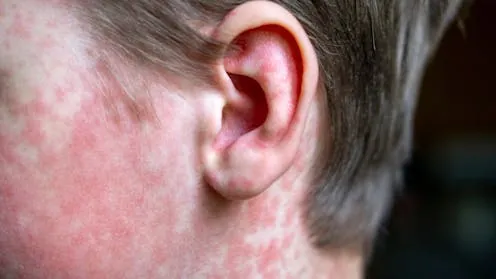
Tragic Loss: Child Dies Years After Measles Infection — Uncovering SSPE
2025-09-15
Author: Benjamin
A Heartbreaking Reminder of Vaccine Risks
In a devastating incident in Los Angeles, a school-aged child has succumbed to a rare but fatal brain condition linked to a past measles infection. This tragedy shines a spotlight on the urgent need for vaccinations as rates continue to decline.
What is SSPE?
The child developed subacute sclerosing panencephalitis (SSPE), a debilitating condition that often emerges years after a measles infection. Sadly, SSPE affects approximately one in 10,000 measles cases, but for infants infected before their first birthday, that risk skyrockets to one in 600.
The Silent Progression of a Killer
SSPE begins with subtle symptoms that can easily be misinterpreted as learning difficulties. However, over time, the situation escalates into severe dementia, involuntary movements, and seizures. Despite treatment options involving antiviral and anti-inflammatory drugs, the prognosis remains grim, with nearly all patients succumbing within five years.
A Growing Threat
This heartbreaking tale reflects an alarming trend—measles is resurging in areas that once boasted high vaccination rates. The U.S. Centers for Disease Control and Prevention has recorded nearly 1,500 measles cases in just this year alone.
Vaccination Myths and Misinformation
The decline in vaccination rates has been fueled by discredited research linking the MMR vaccine to autism, alongside rampant misinformation perpetuated on social media. These unfounded fears have been further aggravated by vaccine skepticism stemming from the COVID-19 pandemic.
The High Stakes of Measles
Before the introduction of the measles vaccine in the 1960s, the UK suffered between 100,000 and 800,000 measles cases annually, with global fatalities ranging from 2-3 million every year. Measles is a notoriously contagious virus, capable of infecting nine out of ten unvaccinated individuals who come into contact with it.
The Power of Vaccination
The measles vaccine is a powerhouse of effectiveness, boasting a 97% efficacy rate and preventing over 60 million deaths worldwide between 2000 and 2023. Herd immunity, achieved through widespread vaccination, is crucial in protecting those—like the young child in Los Angeles—who are too young for the vaccine.
Diagnosing and Understanding SSPE
Medical professionals can identify SSPE through brain scans and tests that measure electrical activity and spinal fluid for antibodies. Unfortunately, due to the rarity of the condition, treatment options are severely limited, hindering large-scale clinical trials.
Facing a Grim Future
The measles virus can remain dormant in the body after initial infection, later mutating and attacking the brain, causing irreversible damage. While SSPE was once prevalent in developing nations, falling vaccination rates threaten to bring it—and other preventable diseases—back into our communities.
A Call to Action
As we witness these current outbreaks, health officials caution that more tragic cases may emerge in the future. The unfortunate reality is that by the time SSPE becomes a common concern again, it will be far too late to implement effective vaccination strategies.
A Wake-Up Call
The recent death of this child in LA serves as a stark reminder that measles is far from a benign childhood illness. It can lead to severe complications, including pneumonia and, as this case so tragically reveals, long-term brain damage that manifests years later.









 Brasil (PT)
Brasil (PT)
 Canada (EN)
Canada (EN)
 Chile (ES)
Chile (ES)
 Česko (CS)
Česko (CS)
 대한민국 (KO)
대한민국 (KO)
 España (ES)
España (ES)
 France (FR)
France (FR)
 Hong Kong (EN)
Hong Kong (EN)
 Italia (IT)
Italia (IT)
 日本 (JA)
日本 (JA)
 Magyarország (HU)
Magyarország (HU)
 Norge (NO)
Norge (NO)
 Polska (PL)
Polska (PL)
 Schweiz (DE)
Schweiz (DE)
 Singapore (EN)
Singapore (EN)
 Sverige (SV)
Sverige (SV)
 Suomi (FI)
Suomi (FI)
 Türkiye (TR)
Türkiye (TR)
 الإمارات العربية المتحدة (AR)
الإمارات العربية المتحدة (AR)